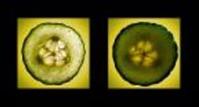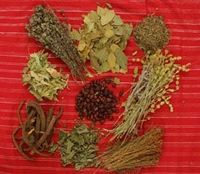You are Here Now Eat


Let nature set your table. Moderation and balance are keys to discovering the Joy of Eating.
Nature provides the right foods at the right time. Balance requires that our table should be full of colors, textures and flavors where even spices have healing properties. The more variety we consume, the more our bodies will find harmonious balance and remain healthy. Because nature is ultimately responsible for our diet, the ancient Chinese knew that the fruits and vegetables that grow during a particular season actually ward off illness. Anything out of season, imported or brought to our table might contribute to what the Chinese would call excessive ‘dampness.’ The symptoms of dampness include low energy and excessive phlegm.
'Dampness' is the way we feel when we have a cold.
Honoring the balance between expending energy and taking it in, when we are older, the same diet and the same amount of exercise will not keep our weight in check. As the body relaxes its energy needs, this energy accumulates as fat.
A surplus of energy requires that we either eat less or exercise more.
The body uses up energy at the same time that it generates and stores it. An overly disciplined diet of specific substances is unnatural and can actually make us unwell. The way of nature moves forward and backward as the seasons change. It can become our role model to help us understand the principle of moderation. Whenever anything is overly demonstrated, or depleted in the natural world the opposite condition emerges to strike a balance.
When there is too much heat in the atmosphere, nature pulls cold pressure systems from its northern regions, southward. In swirling clouds, thunder becomes the sound of this imbalance or excessive energy, which is discharged as lightning. Wind and rain appear until the atmosphere begins to cool. As the climate grows excessively cool, warmth is drawn from the southern regions and the cycle repeats itself.
Even forest fires and hurricanes are part of nature’s
regenerative processes and the human body is no different.
If we are mentally over depleted, the body will pull energy southward to make us appreciate the need for balance. Too much sugar and we burn through our energy reserves, although a diet without glucose is not healthy either. Avoiding carbohydrates can help us lose weight initially, although the increased intake of protein, soy, tofu and other foods can create their own imbalances. Soy contributes to dysfunctional estrogen levels in women, while animal proteins and fats can put extra strain upon the heart. A diet of only fish can lead to a mercury imbalance, while completely eliminating carbohydrates and sugar from our diet can starve the brain of vital nutrients, leading to neurological imbalances.
During winter, pomegranates and pumpkins abound and have a drying effect that offset cold and dampness in the organs. During summer, citrus fruits offset dryness and heat. Fruit it is by nature cold and wet, and can actually exacerbate cold and damp conditions in the organs when over consumed during winter. On the other hand, during spring when allergy symptoms appear, sour fruits can actually control and even eliminate the over-production of histamine.
Western doctors are like mechanics, and we generally only see them when we are unwell. If our condition is not their specialty, we are sent to another specialist. The eastern doctor is more of a gardener. They will take time to understand the whole life of the patient to determine the proper treatment that will return balance. Eastern medicine is based upon the same principles that a gardener would use to grow a plant.
Too much sun and the leaves wither,
too much water and the roots will rot.
Either condition leaves the plant unable to process vital nutrients.
The Chinese view digestion as a pot or cauldron that must cook the contents of what we eat so that nutrition can be properly assimilated. Slightly warmer than our normal body temperature, it is warmth that funds digestion. In the west, we drink cold drinks with our meals, while in the east, warm beverages are known to aid the digestive process.
The cauldron or stomach is said to have an aversion to dryness. The spleen is viewed as the fire that drives the digestive processes and has an aversion to dampness. One may feel excessive thirst or dryness when the stomach is working overtime to digest large meals or raw foods. Since the spleen is expending great amounts of energy to transport excess fluids to other parts of the body, one may feel fatigued and tired. Cold liquids only add to the imbalance. An imbalance of dampness requires that we stop drinking fluids with meals. Since it starves the spleen of its dampness, it will be forced to give up what has waterlogged and fatigued the system.
The next time you have a cold, try consuming foods and liquids that are considered warming, drying and nutritious in the eastern tradition.
Cook lentil soup, but only drink the broth. This has an excellent drying effect and is prescribed to eliminate excess phlegm. Eat only white meat and sparingly, and be moderate in your fruit consumption, which is cold and wet. When we are fatigued, we tend to eat more sugar for the short bursts of necessary energy. This further causes a system in overdrive to become fatigued so avoid it.
Finally, we tend to believe that raw vegetables are more nutritious than cooked vegetables. Raw broccoli may have more vitamins and nutrients than cooked broccoli, although the vitamins and nutrients of raw vegetables are locked within hard to digest cellulose packets and ultimately, we may only absorb half of its vital nutrients. Since cooked vegetables make the nutrients more readily available, the net absorption is greater.
During winter, it is important to consume warm foods and liquids. Since the body is using additional energy to keep the body warm - hard to digest, cold or raw foods put unnecessary strain upon the digestive process.
On the other hand, during summer, we are hot and
these cold and damp foods can cool the system.
Keep the fire of the digestive processes burning efficiently and the body will take care of itself. Trust in the foods that nature delivers during the changing seasons to help guide you in your diet. Eliminate excess and work to reduce stress through regular exercise. When diet becomes a discipline and the joy of eating is non-existent, simply return to the way of nature to discover wellness.
Tao Of Food

Taoism is the practice of blending into the seamless unity of life to avoid unnatural imbalances. Based on the idea of Yin and Yang, it teaches us to move toward activity and repose in equal measure. All of life can be classified as variations of Yin and Yang and food also possesses these qualities.
“There are times to move forward and times to be still.” Without opening to the magic of life as it unfolds, we soon discover how “those who go against the way end up being called unlucky.” We can bang endlessly on a closed door when following the path of least resistance always reveals the open door. From a dietary standpoint, find harmony with the flow of life by allowing nature to set your table.
During winter, pomegranate and pumpkin seeds offer drying effects for phlegm production. In springtime, sour citrus fruits like tangerines appear on the earth and counteract histamines brought upon by allergies. Summer is a Yang season where the earth dazzles in its brilliant display of colors, spices and pungent foods. In Traditional Chinese Medicine, summer represents the fire element, which rules the heart and small intestines. As temperatures rise, these organs are put under increased stress.
Spices, pungent herbs, red and green peppers, fresh ginger and garlic are all foods that are good for the heart. Ginger is very effective for digestive complaints such as colic, nausea, gas, and indigestion, which can manifest from prolonged exposure to heat. Both garlic and ginger stimulate circulation and help to reduce high blood pressure.
Garlic lowers cholesterol, strengthens the immune system and aids in the prevention of arteriosclerosis. Garlic is very useful in the relief of summertime bronchial coughs, asthma, head colds, and as a laxative to eliminate intestinal gas. The word “hsin” in Chinese means heart/mind where they are connected. Since the heart is believed to be the seat of emotion - housing the mind, caring for the heart benefits the mind and therefore, garlic is used to improve mental outlook.
In many tropical climates, especially where inhabitants remain indigenous to their ancient and shamanic roots, ingesting spices is a dietary staple. At first, spicy foods increase body warmth, but ultimately they bring excess body heat to the exterior where it can be released. Bringing heat to the surface also restores harmony and balance with what unfolds, where the increase in external temperature is not as uncomfortable.
Cinnamon is another spice used in Traditional Chinese Medicine to “release the exterior” and eliminates excess heat. It can be added to virtually any preparation for its added zing of flavor and balancing properties. Adding cinnamon to pasta salads and pungent basil to just about any food is a way of visiting “nature’s grocery store” to remain in harmony with the season.
Since minerals and oils are sweated out of the body during summer, it is important to add them back into the diet. Before you invest in expensive electrolyte drinks, visit the Farmer’s Market and buy from nature’s bounty. Most summer fruits and vegetables contain calcium and minerals, while nuts can replenish oils. Tomatoes, strawberries and blackberries are an excellent source of calcium and iron. For children, an iron rich snack are sun soaked raisins.
While we have grown accustomed to getting these foods delivered from around the world all year, the key to finding balance in the diet is to shop specifically for seasonal foods. Avocado, artichoke, kale, corn and peas are an excellent source of minerals. Make a dazzling display of color in meal preparation to mirror nature’s landscape during summer.
Foods that “cool summer heat” include watermelon, apples, lemons and limes, which also proliferate during summer. The white part of the watermelon rind can be processed as a natural skin mask to heal sunburn and restore the complexion, much like aloe vera. Watermelon rind contains citrulline, which acts as a vasodilator, relaxing the blood vessels and improving circulation. Where heavier foods like dairy and meat cause sluggishness, nature’s juicy and abundant summer foods replenish lost minerals and cool the system.
Just as the sleeping landscape blooms when nurtured by the sun, awake early and reach for the sun to reset your battery. Be joyful and place yourself in service to allow the outside world to enter and nurture you. "Only by giving can you discover your gifts." Those who have a healthy heart are genuine, friendly and attentive. Giving with a happy heart and open mind reminds us of our relevance in what unfolds “When you place yourself in a position to help another, you discover your real capabilities.” Summer is a time to discover just how magical life can be.
At the onset of Spring when pollen can aggravate allergies, look to citrus as a natural anti-histamine. No matter the season, everything you need to find wellness will be blooming around you. Today we can buy just about any item out of season, but it is best to shop locally and choose items that are naturally in season. When setting your table, try to include all colors, varieties, spices, herbs to achieve wellness by remaining balanced.
